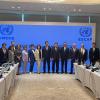News
Displaying Results 1 - 16 of 16
Increasing the use of digital solutions including those developed by the United Nations Centre for Trade Facilitation and Electronic Business (UN/CEFACT) can enhance the sustainability and resilience of supply chains and strengthen global connectivity.
In a series of capacity-building activities…
During its recent mission in Turkmenistan, a UNECE delegation presented a proposal for a new analytical project - “Trade and Innovation for Sustainable Development of Turkmenistan” - to the government and international stakeholders, aimed at supporting the country to enhance innovation governance…
SPECA countries are facing unique challenges, stemming from at least three crises: the need to deal with the regional and global repercussions of the COVID-19 pandemic, the political upheaval in Afghanistan, and the conflict in Ukraine. With the correct policies and mechanisms for subregional…
Transitioning towards a knowledge-based economy away from a resource-intensive model of economic growth is central for sustainable development among the seven countries of the UN Special Programme for the Economies of Central Asia (SPECA) - Afghanistan, Azerbaijan, Kazakhstan, Kyrgyzstan,…
The new UNECE Guide on producing CPI under lockdown, published today, helps national statistical offices to produce the Consumer Price index (CPI) under periods of lockdown and other emergencies.
The Consumer Price Index, or CPI, is a key economic indicator in most countries, giving a …
Developing the capacity of statistical systems to respond to ever-changing demands is a core component of UNECE statistical work, linked directly to several of the targets of the 2030 Agenda for Sustainable Development. Key tools used for capacity development have traditionally been face-to-face…
Countries of Central Asia, the Caucasus and Eastern Europe have been hit hard by the socioeconomic impacts of the COVID-19 pandemic, which threatens to derail sustainable development progress in the region.
However, there is also a stronger momentum towards regional cooperation, and countries can…
In 2022, we will celebrate 30 years since the formulation of the Fundamental Principles of Official Statistics and their adoption by UNECE. The Fundamental Principles were subsequently adopted in 1994 by the United Nations Statistical Commission; endorsed by the Economic and Social Council (ECOSOC…
Statistics are all around us. All the more since the COVID-19 pandemic began. Rarely do we see a news story, political debate, press conference or even a social media debate that doesn’t reference statistics. In this environment, the custodians of the figures—the national statistical offices (NSOs…
A team of expert labour statisticians is to be convened by UNECE for the Conference of European Statisticians, to investigate how to reflect new ways of working in the employment figures we use every day.
Over the past year the work-from-home orders and business closure rules issued by many…
The importance of statistical information to help us cope with disasters has never been clearer than over the past year. As the Covid-19 pandemic has gripped the world, numbers have become our bread and butter. Yet the pandemic has also highlighted the challenges and imperfections in many systems; …
A new working paper, Measuring Migration and Remittances in UNECE Countries during the Pandemic, reveals both innovative solutions and continued hurdles as countries strive to gather information about international migration under pandemic conditions.
The onset of the Covid-19 pandemic brought…
With the COVID-19 pandemic, Trade facilitation has acquired even greater importance for the land-locked countries of Central Asia, as it helps remove burdensome formalities for their trade and transport operations. Simplifying and digitalizing procedures helps diminish physical contacts along…
A circular economy is a paradigm which can contribute to reducing the economic, environmental and social costs of resource use, while at the same time strengthening economic competitiveness, reducing poverty, and providing better quality of life, in line with the United Nations 2030 Agenda for…
A new working paper, Adapting household surveys to the situation of the pandemic, shows that statistical producers in countries in the UNECE region have moved fast to measure the effects of the pandemic on households, and to adapt data collection to crisis conditions; but they need support for…
The economic downturn due to COVID-19 will hit the countries of the UN Special Programme for the Economies of Central Asia (SPECA) – Afghanistan, Azerbaijan, Kazakhstan, Kyrgyzstan, Tajikistan, Turkmenistan and Uzbekistan – hard and exacerbate existing vulnerabilities. As a region highly reliant…
















